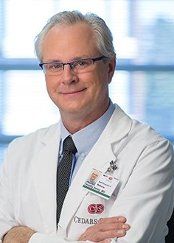Article
CD34+ Cell Therapy Effective for Reducing Angina in NOCAD in Clinical Trial
Author(s):
Data presented at SCAI 2020 examining a novel cell therapy suggests it could help reduce angina in patients with non-obstructive coronary artery disease.

Timothy Henry, MD
Research from a clinical trial presented at the Society for Cardiovascular Angiography and Interventions (SCAI) 2020 scientific sessions indicates a novel cell therapy shows promise for reducing angina in patients with non-obstructive coronary artery disease (NOCAD).
Sponsored by the National Institutes of Health, results of the study suggest autologous CD34+ cell therapy was effective for treatment of coronary microvascular dysfunction (CMD) in patients with angina and non-obstructive coronary arteries.
The Exploratory Study of CLBS16 in Patients with CMD (ESCaPE CMD) was designed by Timothy Henry, MD, of the Carl and Edyth Linder Center for Research and Education, and a team of colleagues to explore the impact of the CLBS16 agent from Caladrius Bioscience through an open-label, phase 2, proof-of-concept trial. Designed to reduce the cardiovascular consequences of damage to the inner walls of the heart’s blood vessels, CLBS16 is designed to use CD34+ cells’ ability you repair small blood vessels or microcirculation.
For inclusion in the proof-of-concept trial, patients were required to have no obstructive disease on coronary angiogram, angina 3 or more times per week, or an invasive intracoronary adenosine coronary flow reserve of 2.5 or less. Exclusion criteria included acute coronary syndrome or myocardial infarction within the past 90 days, presence of significant valvular heart disease, a left ventricular ejection fraction less than 40%, and requiring anticoagulation.
ESCaPE CMD enrolled a total of 20 patients—this cohort had a mean age of 54.3±12.7 years, a mean BMI of 29.5±7.3 kg/m2, 85% were female, and 80% were white. Among these 20 patients, the mean systolic blood pressure was 126.8±19 and mean diastolic blood pressure was 76.9±13.2. Additionally, 55% were taking beta blockers, 80% were receiving nitrates, 50% were receiving calcium channel blockers, and 25% were taking ranolazine at baseline.
Patients included in the trial received GCSF 5mcg/kg/day for 5 days before leukapheresis, followed by manufacturing to enrich the CD34+ cell content. Investigators administered cells through a single 10mg infusion to the Cells were administered via a single infusion to the left anterior descending (LAD) coronary artery.
Investigators assessed the impact of the therapy across multiple outcomes, including invasive CFR, angina frequency, the Canadian Cardiovascular Society (CCS) class, the Seattle Angina Questionnaire (SAQ), and modified Bruce exercise treadmill test (ETT) at 6 months.
Upon analysis, investigators noted a mean gain in CFR from baseline of 0.62 (95% CI, 0.219-1.024; P=.0045)) in the 19 patients included in the final analysis. Results also indicated a mean reduction of -2.34 (95% CI, -3.801 to -0.879; P=.0036) in angina frequency, improvements in CCS angina class, and improvements in SAQ scores at 6 months. In regard to safety, there were 0 deaths, 0 cell-related adverse events, no instances of myocardial infarction or repeat revascularization, and 1 procedure-related focal dissection with stent observed during the study.
Investigators noted a randomized, blinded clinical trial was being planned based on the results of this trial.
This study, “Autologous CD34 Cell Therapy For Treatment Of Coronary Microvascular Dysfunction In Patients With Angina And Non-obstructive Coronary Arteries,” was presented at SCAI 2020.





